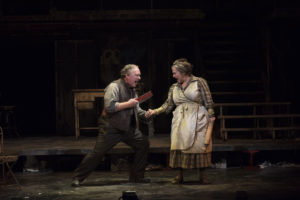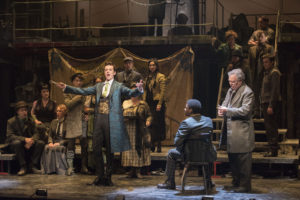What sort of parting gift do you give someone who’s been running a theatre company for 14 years, someone who has taken it to heights both critical and financial, built it into an even greater success than it was when they took it over? If you’re Jackie Maxwell, you get to choose your gift: she chose Sweeney Todd.
Maxwell has directed three Stephen Sondheim musicals in her tenure as artistic director of the Shaw Festival, and programmed three more that she didn’t direct. “Sweeney Todd is a perfect fit for us on so many levels and I have given it to myself to direct as my ultimate goodbye present!” she wrote earlier this season.
It’s a gift she’s sharing with thousands of theatre-goers: this production of Sweeney Todd is a not-to-be-missed triumph, a nearly flawless melding of music and storytelling that will stick with you long after the last chord rings out.

Benedict Campbell as Sweeney Todd and Corrine Koslo as Mrs Lovett in Sweeney Todd: The Demon Barber of Fleet Street – A Musical Thriller. Photo by David Cooper.
The story of Sweeney is usually summed up briefly: a barber with a thirst for revenge kills his customers, and Mrs. Lovett, the lady downstairs, makes them into meat pies. That certainly captures the eye-popping elements of the story, but in many ways those are the least significant parts of the tale. The story that keeps us engaged isn’t about murder, or whether Sweeney and Mrs. Lovett will get away with it; Sweeney Todd is about obsession and love and revenge.
Sweeney is a barber who was unjustly imprisoned and deported, wronged by a judge who lusted after Sweeney’s beautiful wife. The judge raped the wife and then took Sweeney’s daughter as his ward; Sweeney has come back to London in disguise, determined to take revenge on the judge.
It’s a tale of one man’s tragic descent into madness – or rather, about his embracing the madness that is already nipping at his heels when he first steps onto the stage. And it’s about the obsessions of those around him, who all in their own way compound and mirror Sweeney’s dark journey. We don’t watch Sweeney Todd to find out how it ends; we watch it for the same reason we watch Macbeth or Lear or Hamlet: because there’s something irresistible and horrifying about seeing a tragic hero unwind before our eyes.
And what a hero we have in Benedict Campbell, who plays the title role! He perfectly captures the weariness of a man who has been hollowed out by grief, who is only kept alive by the hope of getting revenge on his tormentors. When his Sweeney becomes animated or excited or shows signs of happiness, it’s horrifying, a mockery of genuine happiness that’s driven only by the darkest of motives. His performance of the Epiphany toward the end of the first act is absolutely mesmerizing, one of the finest moments of theatre you’ll see anywhere.
Corrinne Koslo’s Mrs. Lovett is a perfect foil for Sweeney. As he becomes a dealer in death, Mrs. Lovett begins to hope for a better life, spiralling upward toward the light even as she engages in the grim business of making meat pies from Sweeney’s victims. Koslo captures the character’s desperation and self-delusion beautifully.
She also has a deft touch with humour, bringing tremendous levity to the stage. This is a very funny play in places, and Koslo makes the most of it. The scene where she first proposes a plan to ensure the “meat” doesn’t go to waste is deliciously funny, and Maxwell’s direction and Koslo’s comic timing make the most of it.
Equally delightful is Kyle Blair’s Signor Pirelli, a street barber who engages Sweeney in a shaving contest. Blair is a treat to watch in the role, his movements sending ripples of laughter through the audience at every turn.

Kyle Blair as Adolfo Pirelli and Benedict Campbell as Sweeney Todd with the cast of Sweeney Todd: The Demon Barber of Fleet Street – A Musical Thriller. Photo by Emily Cooper.
Vocally, Maxwell and music director Paul Sportelli have done an amazing job of casting the play. This is an extremely complex score, filled with the intricate harmonies and unexpected intervals that Sondheim loves, and the entire company nails every bit of it. The chorus and orchestra aren’t just competent, they’re thrilling, driving the story forward with energy and precision.
Koslo and Campbell are actors who can sing rather than singers who can act, and that’s a perfect way to cast the two most complex characters on stage. The emotionally charged journey of these characters rewards intense performances, and both actors deliver. Their voices are ideal for their roles, powerful and rich in character and able to work the score and convey nuance and effect.
Kristi Frank (Johanna), Jeff Irving (Anthony) and Marcus Nance (Judge Turpin) also bring tremendous vocal talents to the stage All three have sweet, richly-toned voices which are in perfect keeping with their characters. Johanna and Anthony are almost the only truly good people in this entire sordid universe, a pair of young lovers who we desperately hope will be able to escape this dark world; as Frank and Irving’s voices soar in duet, we, too, are able to briefly forget that this is a world where true love rarely escapes unscathed.
Judge Turpin is more complex: he’s every bit as depraved as anyone else, but he’s also the only one who really wrestles to overcome his dark side. Marcus Nance’s deep, oaky sound is perfect for the role, reflecting the civilized and restrained front that Judge Turpin presents to the world.
Sweeney Todd is one of those rare musical plays that transcends its genre, a play that engages us in a way that few musicals can. There is no such thing as a definitive version of Sweeney Todd – it’s too big a play for that – but this year’s production at Shaw is certainly a great one. It richly deserves all of the praise that has been heaped on it.
Sweeney Todd runs until October 19. And while some summer theatres, and summer theatre towns, are winding down for the season, Niagara-on-the-Lake still has plenty of activity. The streets of this incredibly beautiful town are a bit quieter now than at the height of the season, but only just. There’s an incredible wealth of dining options, and events as diverse as the Canadian Steampunk Exposition, a festival celebrating the art of stone building, and tours of local cemeteries. And, of course, there’s a ridiculous number of vineyards to explore. The Niagara-on-the-Lake tourism association runs a superb website that’s a good place to start planning your trip.

Blogger Andrew Wagner-Chazalon